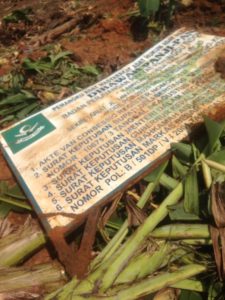
 Eviction by PTPN II Intercepted by Indigenous Women of Rakyat Penunggu (picture unknown 2017).
Eviction by PTPN II Intercepted by Indigenous Women of Rakyat Penunggu (picture unknown 2017).
PT Perkebunan Nusantara II (PTPN II) seized again the Indigenous Peoples Penunggu’s territory. Results from monitoring the field yesterday (14/12) showed that PTPN II with apparatus of military or polices, and Pamong Praja leveled the gardens, fields and homes of the People of Penunggu in Kampong Bangun Rejo, Deli Serdang, North Sumatra.
The State’s plantation company claims to have an extended permit on concession. Whereas the Indigenous Peoples of Penunggu have submitted data related to the indigenous territory directly to the President of the Republic of Indonesia and included the data of indigenous communities, and their customary territories to become the priority location of Land Object of Agrarian Reform to Ministry of Agrarian and Secretariat of President Staff.
The eviction was intercepted by the Indigenous Peoples, men and women, who were gardening. The Indigenous Women of Penunggu asked for the ev5 indigenous women, one of them a pregnant mother, climbed onto the heavy equipment.
From Wani’s testimony (15/12), the authorities tore her hands, feet and body when she and other indigenous women were on the bulldozers. “I was beaten (pulled away-red) by the police, policewoman and Pamong Praja”, she said while simulating the apparatus’ action against her. For this middle-aged woman, the violence she experienced did not make sense. “We are just a few, but treated like a robber”, Wani protested.
Now, PTPN II aim to seize 22 points of Penunggu’s indigenous territory based on its 3 concessions. This state-owned enterprise’s execution was escorted by 450 police officers. Meanwhile, the indigenous women of Penunggu Kampung Bangun Rejo have built a simple post to protect their gardens and fields from the eviction of PTPN II’s heavy equipment.
Based on the report from the National Human Rights Commission, agrarian conflict in the last five years had escalated up to 80 percent or about 1,653 cases. The most complained about institutions are the police, followed by corporations, both state-owned enterprises/regional owned enterprises and private sector, and local governments. In the National Year-end Notes of National Commission on Violence Against Women (2017) shows that natural resource conflicts threaten the loss of indigenous women’s roles on food and sources of life.






Leave a Reply